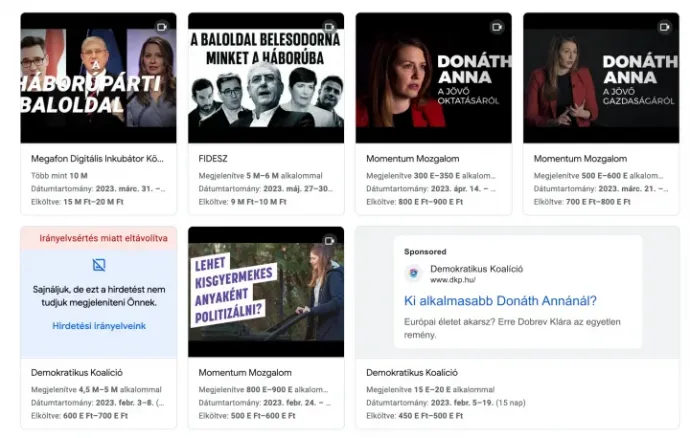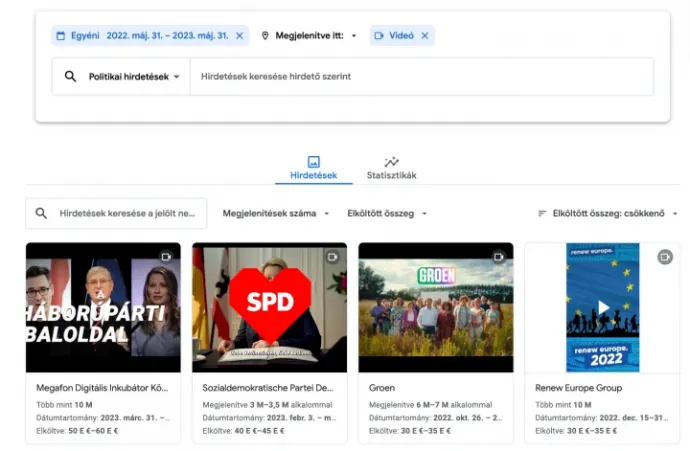Campaign of Orbán's mouthpieces on "pro-war left" second most expensive political YouTube campaign in Europe this year

It’s been more than a year and a half since Hungary’s 2022 parliamentary elections, and since then, the average Hungarian Internet user has had some serenity, as they have not been bombarded with political ads on all channels the way they were during the campaign. This grace period is slowly coming to an end, however, as next year's municipal and EP elections draw ever closer. Since experience has shown that advertising on social media is very effective and can be used to circumvent regulations on campaign financing, it is likely that politicians, parties and government-friendly 'NGOs' and propaganda products will yet again turn up the intensity of advertising and will push their messages all the way to the edge of our pain threshold. We examined the numbers at the two biggest platforms when it comes to online advertising to see where we currently stand, and found some surprising things.
A significant portion of the Hungarian online advertising market has been dominated by two players, Google and Facebook (or rather, their parent companies Alphabet and Meta) with each maintaining a publicly available database for advertisements related to politics and public life. We examined ads published in both Meta’s Ad Library and the Google Ads Transparency Center over the 90-day period between early March 2023 and the end of May of the same year.
An unexpected record
On Google, we mapped the ads that appeared before and during YouTube videos, and those served by AdSense to all kinds of sites, whether they be texts and photos or videos. Although there's typically less money spent on Hungarian political ads here than on Facebook, it's still a very important platform because it allows for reaching audiences that are no longer on Facebook or spend very little time there. This is typically the younger age group.
The most expensive advertising campaigns in Hungary between March and May 2023 on this platform were as follows:

Three things are immediately clear:
- Compared with the opposition, the government is in a league of its own when it comes to finances. Campaigns amplifying the Fidesz narrative are costing tens of millions of forints, while the opposition is spending a few hundred thousand on their ad campaigns.
- The official campaign of Fidesz and that of Megafon, (The Megafon centre was launched with the mission to train “professional Facebook warriors” to help them amplify their suppressed voices on social media. More on that in this article.)which is supposedly completely independent of Fidesz, are practically identical.
- The opposition party, Momentum has been working to establish Anna Donáth as the challenger of Viktor Orbán, while DK is not necessarily positioning Klára Dobrev for the same role. Instead, Dobrev is being positioned against Donáth.
With more than 10 million views and the price tag of around HUF 20 million, Megafon's advertising stands out to such an extent that we examined it in a broader context. It turns out that this was the second most expensive political YouTube campaign in all of Europe, not just between March and May 2023, but for the whole of 2023, and indeed for the whole 12-month period since May 2022. But even in the US, which typically spends much more on political ads and is a much bigger market than Hungary, the Megafon campaign would still make the list of the top 10 most expensive YouTube ads this year, which is astounding.

Especially astonishing in all of this is that the propaganda machinery managed to pull this off during the country's dry season in politics while there were election campaigns with very high stakes going on in several EU countries. Despite all that, neither the Czech, nor the Finnish, Slovenian, Italian, Swedish, Austrian and Danish elections were able to generate the kind of expensive YouTube advertising that Megafon delivered to reinforce the Orbán government's message about the "pro-war left" which it had been pushing for a year.
Naturally, one wonders what the point of this was, and the answer is probably somewhere along the lines of keeping the narrative in the fanbase and the undecideds alive, while repeatedly reinforcing who the enemy is. It is for this reason that even when there are no specific stakes, the message needs to be reiterated and reasserted. Much in the same way as a booster shot helps maintain the body's antibody levels against a pathogen.
But so that we wouldn't only talk about a single, outrageously expensive campaign, we also checked how much money was spent on Hungarian political advertising on YouTube between March and May of 2023. Seven advertisers accounted for the bulk of the total of €103,000 (HUF 38 million), with all others spending less than €500 each:
- Megafon, €52 800 (HUF 19.6 million)
- Fidesz, €24 600 (HUF 9.1 million)
- Momentum, €10 900 (HUF 4 million)
- Demokratkus Koalíció €5,100 (HUF 1.9 million)
- Mi Hazánk €3100 (HUF 1.1 million)
- Péter Márki-Zay, €1150 (HUF 430,000)
- Jogállam és Igazság Kft. (official maintainer of the Centre for Fundamental Rights), €1,100 (HUF 410,000)
The picture isn't that different: roughly three quarters of the funds spent on advertising are used to spread Fidesz's narrative, while Momentum and DK are the only opposition parties showing signs of life. It should be noted here that Péter Márki-Zay's ads are typically targeting users in Hódmezővásárhely (where he is mayor) which means that the target audience is quite well reached even with relatively little money.
Where even more money is involved
But the truly big arena for Hungarian political advertising is Facebook. A good illustration of this is that while Megafon spent two and a half times as much money here as on YouTube, and while its spending there made it the second biggest political spender in Europe, on Facebook it only came second in the national rankings.
So who were the biggest advertisers on Facebook in Hungary between March and May this year?
| Money spent on advertisements (in HUF) | ||
|---|---|---|
| 1. | Mediaworks | 68 200 000 |
| 2. | Megafon | 48 700 000 |
| 3. | The Hungarian government | 21 600 000 |
| 4. | Other pro-government media | 12 600 000 |
| 5. | Momentum | 12 100 000 |
| 6. | Nyugati pályán | 11 400 000 |
| 7. | Demokratikus Koalíció (DK) | 9 900 000 |
| 8. | Center for Fundamental Rights | 8 000 000 |
| 9. | LMP | 6 400 000 |
| 10. | Fidesz | 5 100 000 |
- The "other pro-government media" category mostly covers Hirado.hu and (the since defunct) Pesti Srácok.
- Of Momentum's 12 million, 3.7 million were spent on Anna Donáth's page, while half of DK's 10 million covered Klára Dobrev's ads.
- Budapest mayor Gergely Karácsony barely missed the list with 4.5 million spent on Facebook ads.
- The biggest advertisers within the Mediaworks group were Origo (14.2 million), Mandiner (8.4) and Magyar Nemzet (6.8), all of which would have made it to the top of the list individually as well with these amounts.
- Megafon spent the most money on advertising the pages of Dániel Bohár (8.7 million), Tamás Korondy (8.3), Stefi Déri (7.6), and Bence Apáti (6.5), they would each have been in the top 10 individually as well.
Although there is significantly more money at stake here than in the world of YouTube advertisements, the balance of power is roughly the same: there are just a few opposition voices heard in addition to the Fidesz choir.
So what can we expect now?
Although we have seen that the pro-government propaganda machine can burn up quite a lot of fuel even when the engine is on idle, the campaign is expected to pick up again soon, before intensifying to the point of being unbearable again right before next June. Fidesz is likely to resume the character assassination of Budapest mayor Gergely Karácsony as well as the slogans about the "pro-war left", with the latter probably staying on even after the war is over.
Meanwhile, on the other side, we can expect more and more episodes of DK and Momentum battling it out for the position of the leading opposition party. So for now, everyone should enjoy the peace and quiet while it lasts, because once this is over, it will be hard to use the internet without political advertising and propaganda oozing out of everywhere for quite a while.
Or will it? An interesting aspect of Megafon's gigantic YouTube advertising campaign is that despite the fact that the number of views exceeded 10 million, despite it having been the second biggest Hungarian-language political campaign of all time on YouTube, it somehow failed to generate any reactions. In the spring of 2021, when Fidesz started flooding YouTube with the "Gyurcsány Show" ads, it really made an impact.
The ads were truly everywhere, and everyone was talking about them: some were outraged because they agreed with their message, while others were upset over how untrue it all was, and yet others just wanted to be left alone to watch YouTube in peace. In contrast, there has been no substantive reaction this time around: not in the press, not on online forums, not from influencers, nowhere. To be honest, we too only noticed all this now, after the fact, when we consulted the databases.
What could this possibly indicate? One of things it could indicate is that the slogan and the message about the opposition being pro-war has become worn down, or it could also be that advertising on social media and YouTube, a format that seemed fresh and revolutionary in domestic political marketing a few years ago, has simply been worn out.
In theory, this would suggest that Fidesz ought to find fresh voices, fresh packaging and fresh messages for the 2024 campaign – but as long as the opposition is largely silent or preoccupied with itself, they need not worry too much.
For more quick, accurate and impartial news from and about Hungary, subscribe to the Telex English newsletter!